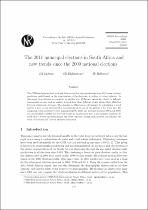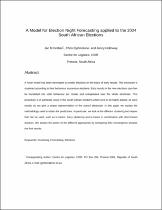JavaScript is disabled for your browser. Some features of this site may not work without it.
- ResearchSpace
- →
- Research Publications/Outputs
- →
- Conference Publications
- →
- View Item
| dc.contributor.author |
Ittmann, HW

|
|
| dc.date.accessioned | 2011-11-09T08:57:20Z | |
| dc.date.available | 2011-11-09T08:57:20Z | |
| dc.date.issued | 2011-09 | |
| dc.identifier.citation | Ittmann, HW. 2011. Local government elections – Some personal perspectives. 40th Annual Conference of the Operations Research Society of South Africa (ORSSA), Elephant Hills Hotel, Victoria Falls, Zimbabwe, 18–21 September 2011 | en_US |
| dc.identifier.uri | http://hdl.handle.net/10204/5275 | |
| dc.description | 40th Annual Conference of the Operations Research Society of South Africa (ORSSA), Elephant Hills Hotel, Victoria Falls, Zimbabwe, 18–21 September 2011 | en_US |
| dc.description.abstract | The Constitution of South Africa requires that both national and local government elections be held every five years. These elections are not held simultaneously; currently, the local government elections are held two years after the national elections. In 2011, the 4th general local government elections took place. These were possibly the most hotly-contested elections since 1994, when South Africa became a democracy. As is the case in many national elections, a forecasting model has been developed to predict the ultimate outcome of the elections, based on early voting results. Such a forecasting model was developed by the Council for Scientific and Industrial Research (CSIR) for the 1999 national elections and has since been used to predict the results for all the national and local government elections to date. Each election poses its own challenges that need to be addressed in the forecasting model. Predictions are computed at national level (“the race for votes”), provincial level and also in the eight metros in the country. Local elections are different from national ones in that there is more than one ballot paper - individuals vote for a candidate in a ward as well as a party; these votes are used for candidates elected through proportional representation. In cases where municipalities fall within districts, there is a third vote for candidates to be elected for district councils. As predictions are computed, these need to be shared through the national public broadcast system, including radio and television stations and the broadcaster's website. Subsequently, other media houses also request specific explanations or analysis. This, in itself, poses challenges. This paper will briefly outline the forecasting model used in the elections, what the expectations were, discuss the predictions as these unfolded over time as well as the challenges, the experiences and the interactions in dealing with the media. | en_US |
| dc.language.iso | en | en_US |
| dc.publisher | Operations Research Society of South Africa (ORSSA) | en_US |
| dc.relation.ispartofseries | Workflow request;7525 | |
| dc.subject | South African elections | en_US |
| dc.subject | Election forecasting models | en_US |
| dc.subject | Election predictions | en_US |
| dc.subject | South African constitution | en_US |
| dc.subject | Local government elections | en_US |
| dc.title | Local government elections – Some personal perspectives | en_US |
| dc.type | Conference Presentation | en_US |
| dc.identifier.apacitation | Ittmann, H. (2011). Local government elections – Some personal perspectives. Operations Research Society of South Africa (ORSSA). http://hdl.handle.net/10204/5275 | en_ZA |
| dc.identifier.chicagocitation | Ittmann, HW. "Local government elections – Some personal perspectives." (2011): http://hdl.handle.net/10204/5275 | en_ZA |
| dc.identifier.vancouvercitation | Ittmann H, Local government elections – Some personal perspectives; Operations Research Society of South Africa (ORSSA); 2011. http://hdl.handle.net/10204/5275 . | en_ZA |
| dc.identifier.ris | TY - Conference Presentation AU - Ittmann, HW AB - The Constitution of South Africa requires that both national and local government elections be held every five years. These elections are not held simultaneously; currently, the local government elections are held two years after the national elections. In 2011, the 4th general local government elections took place. These were possibly the most hotly-contested elections since 1994, when South Africa became a democracy. As is the case in many national elections, a forecasting model has been developed to predict the ultimate outcome of the elections, based on early voting results. Such a forecasting model was developed by the Council for Scientific and Industrial Research (CSIR) for the 1999 national elections and has since been used to predict the results for all the national and local government elections to date. Each election poses its own challenges that need to be addressed in the forecasting model. Predictions are computed at national level (“the race for votes”), provincial level and also in the eight metros in the country. Local elections are different from national ones in that there is more than one ballot paper - individuals vote for a candidate in a ward as well as a party; these votes are used for candidates elected through proportional representation. In cases where municipalities fall within districts, there is a third vote for candidates to be elected for district councils. As predictions are computed, these need to be shared through the national public broadcast system, including radio and television stations and the broadcaster's website. Subsequently, other media houses also request specific explanations or analysis. This, in itself, poses challenges. This paper will briefly outline the forecasting model used in the elections, what the expectations were, discuss the predictions as these unfolded over time as well as the challenges, the experiences and the interactions in dealing with the media. DA - 2011-09 DB - ResearchSpace DP - CSIR KW - South African elections KW - Election forecasting models KW - Election predictions KW - South African constitution KW - Local government elections LK - https://researchspace.csir.co.za PY - 2011 T1 - Local government elections – Some personal perspectives TI - Local government elections – Some personal perspectives UR - http://hdl.handle.net/10204/5275 ER - | en_ZA |








